lessons from 3 years at front row ventures.
Prelude
I’m writing this a few weeks out from my official end date at Front Row Ventures (FRV), which is definitely the most bittersweet feeling I’ve ever felt about something.
After these 3 years, it has been a magical journey for me. I really owe FRV a lot in my learning journey, from someone who had no idea what VC meant to being able to do this full-time after graduation is something that would never have been possible without FRV. Here are my 5 key lessons I’ve taken away from 3 years at FRV that I hope can be useful for anyone reading who is either interested in joining or is currently at FRV (and even for those who aren’t in either!).
If you are reading this and are either thinking of joining or starting out at FRV, I would love to share with you my lessons & core experiences that made this so magical for me and show you how to make the most out of it.
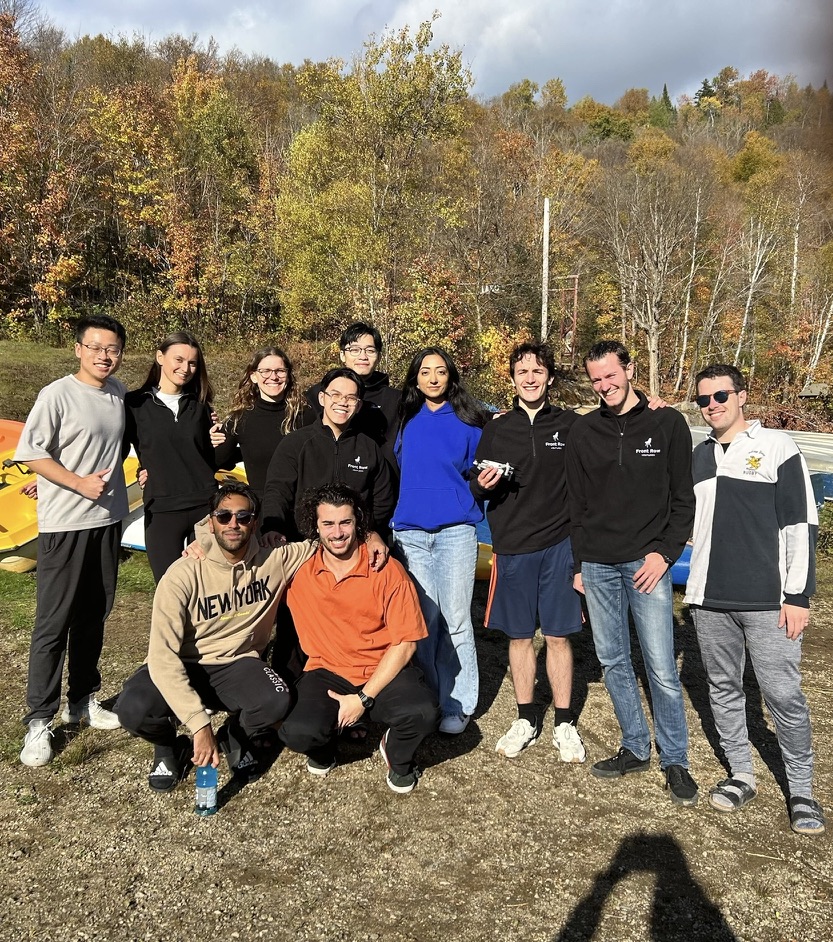 FRV Retreat
FRV Retreat
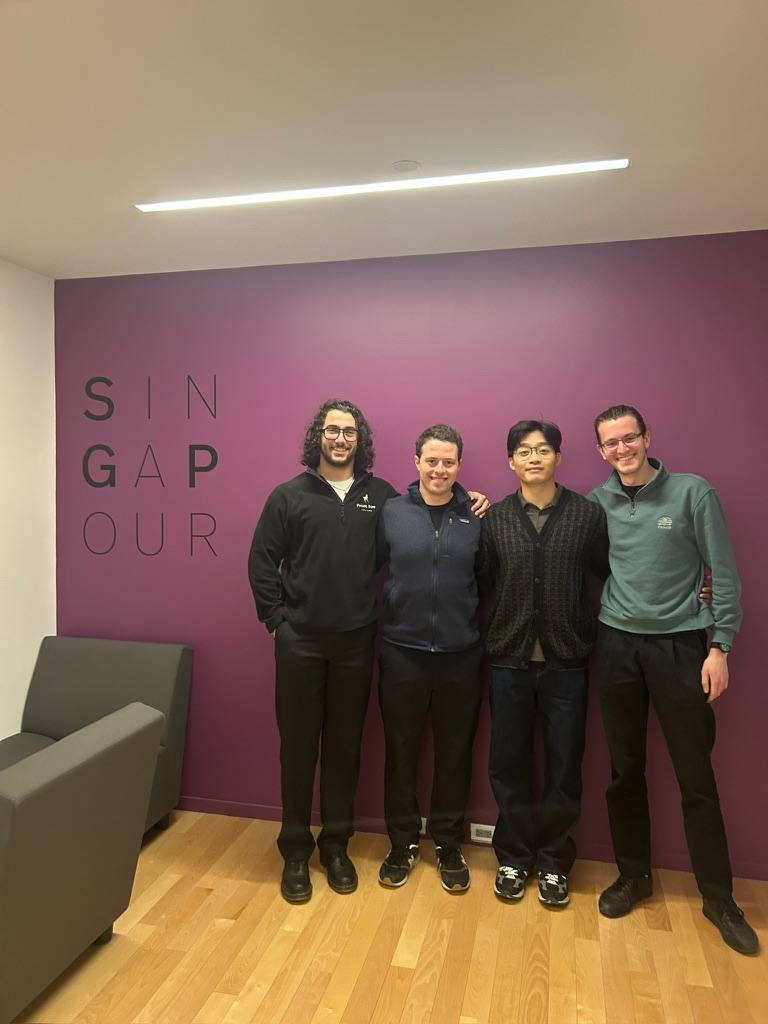 At the office with the other Directors
At the office with the other Directors
The Beginning
My first ever coffee chat reach out when I was a naive first year at McGill was to this fellow economics student who was in his senior year called Saud. At that time I was in a completely different program and was balancing between economics, cognitive sciences, philosophy and deciding which I should pursue.
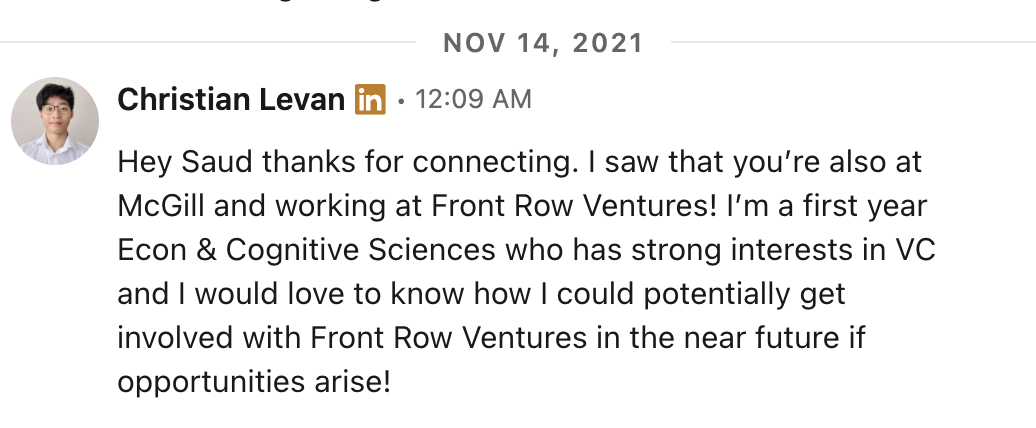
By pure coincidence, I just ran into Saud’s LinkedIn profile and decided to just “shoot my shot” to see how he was thinking about his career past McGill with an economics degree. He was also involved with this organization called “Front Row Ventures,” which seemed pretty interesting to me at the time. I won’t lie, mentioning “strong interest in VC” in that initial reach out was half a bluff but seemed to have paid off.
Saud replied, we hopped on a call, funnily enough he did not mention his economics degree one bit and he just jammed on how amazing FRV was. He encouraged me to apply in the next semester and so I did that.
Lesson 1: Just get your foot in
FRV has several teams, with the investment teams being the most competitive. These typically attract students with finance backgrounds or specialized knowledge in life sciences or something technical - neither of which I had as a first-year student.
I played to my strengths when applying. My GPA was bad at the time so my profile was also nothing too special. I leveraged my existing connections with Saud and Godwin on the current team, highlighted my unconventional background in military service and entrepreneurship, and targeted the Biz Dev team where these qualities would be valued. I focused on getting in first, then making an internal transfer once I’d proven myself. This worked - I got my foot in the door and eventually made my way to where I wanted to be.
I remember telling my partner, “After a year of learning the ropes, my goal is to transfer to the investment team.” The lesson? Get your foot in the door first. You can make lateral moves later once you’ve built relationships and demonstrated your value.
Luckily enough, I got in and from then I knew that this was just the start:
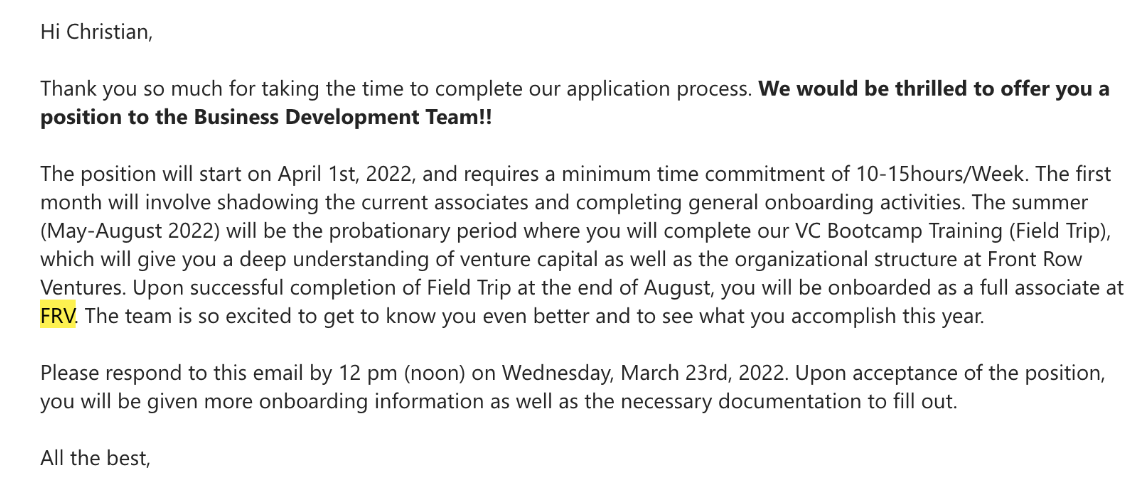 The acceptance email that changed everything
The acceptance email that changed everything
Lesson 2: Be Reliable & Maximise your “Luck”
My first year at FRV was about reliability despite my knowledge gaps. I managed the ESPACE CDPQ account, planning events at a Montreal VC hub, which gave me rare exposure to working directly with FRV’s Managing Partner Manue who was helping to oversee this account.
I turned this opportunity into an advantage by:
-
Creating your own luck: I strategically introduced myself to investors at events, leveraging my organizer role to build connections. This paid off when I spotted an Inovia Capital investor and mentioned my pending application. That two minute conversation got me a first interview, which led to my internship offer later—proof that being in the right place creates opportunities automated systems miss.
-
Proving reliability: I responded quickly, took initiative, and delivered consistently on all tasks for Manue and the ESPACE CDPQ account, treating every assignment as a chance to showcase my execution skills.
This reliability built leadership trust and opened doors to the investment side. When applying for Director of Investment, I was attempting something unprecedented - no platform team member had ever become Investment Director at FRV.
Key lesson: Reliability builds trust, and creating your own luck means showing up where opportunities happen. That two-minute investor conversation led to an internship precisely because I put myself in the right place at the right time and mazimised your “luck”.
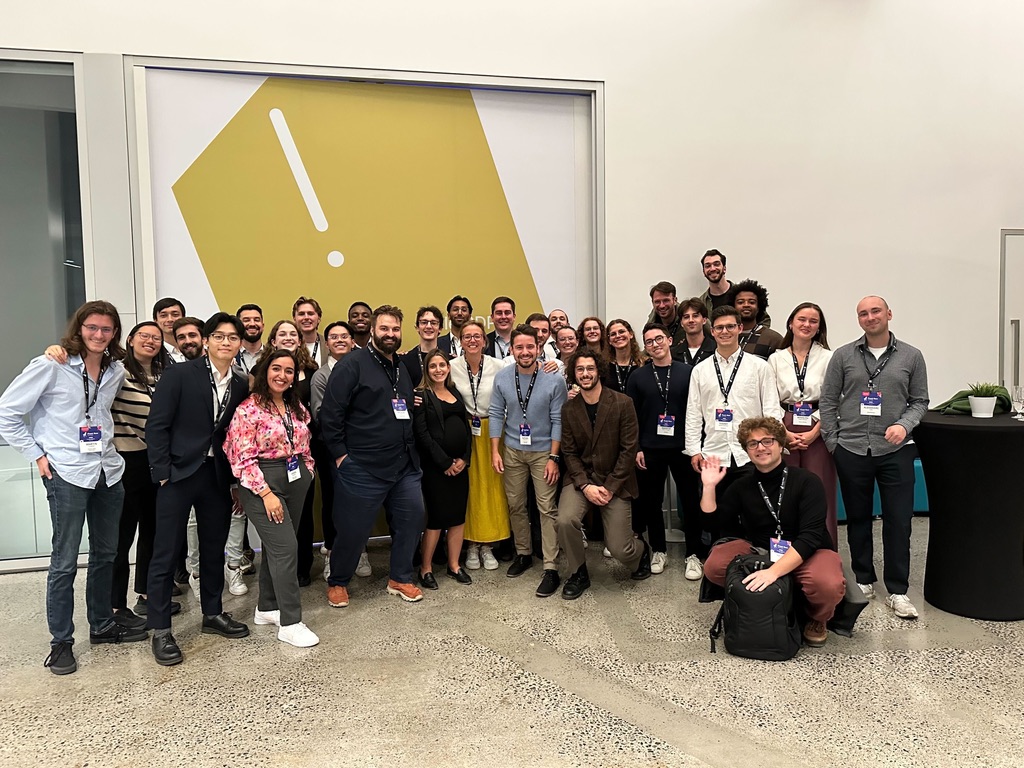 Event at ESPACE CDPQ
Event at ESPACE CDPQ
Lesson 3: Once you get your foot in, remember to execute.
I think this is as equally important as the first piece of advice because I find that most people once they get their “dream” role/position they tend to think the “job is finished”. What most people don’t realise is that the job has barely started. It’s always important to remind yourself that if you want do great things anywhere, from day one you need to be ready to execute.
Relating back to FRV, I knew that once I got my “foot in”, I was off to the races and time was ticking to deliver as much impact as I could to the organisation. Here are a few key questions I asked myself in order to prepare myself mentally to put my best work and foot forward.
-
Why am I here?
Sounds simple right? But in reality lots of folks are driven by surprisingly extrinsic motivators and in order to succeed, I’m a firm believer you must introspect and ask yourself why you want to be at a certain organisation. Having a deeper purpose leads to being able to execute even when the days are tougher because you can always go back to your why.
For me, I wanted to break into vc somehow and learn as much as I could from this once in a lifetime opportunity. I was privileged, not many college students have the chance to learn this first-hand outside the classroom and I wanted to make the most out of it.
-
How badly do I want it?
Another question which sounds rather obvious, but a lot of people are actually not quite honest with themselves on how much they want to achieve a certain goal. If you want it badly you will inherently put in MORE work and it will lead to more fruits of labor for you. (I talk about this a bit more in my fourth lesson).
-
What systems can I create to make my life easier?
In order to execute, creating goals and objectives are helpful but what I learned later on at FRV was the process of creating systems in order to make you more efficient will make your life easier as you manage school, social life and other projects. These systems come in different forms, for me it was time-blocking morning and evening to actively check my FRV email/slack and sometimes work on high priority items where I would be a blocker for the rest of the team.
Key lesson: Once you get your foot in, remember that the work has only begun and you need to prove your place at the table amongst other people at FRV. To do your best work efficiently you need to be able to internally audit your why, how badly you want to achieve your specific goal and create systems for you to execute more efficiently in your day to day
 A more or less accurate representation of how I blocked my calendar to balance all my life items with color coded items
A more or less accurate representation of how I blocked my calendar to balance all my life items with color coded items
Lesson 4: Get to know everyone (I really mean it).
What is unique with FRV compared to any other student related extra-curricular is that you are probably surrounded with the highest density of smart, motivated and hungry university students in Canada who are all interested in startups and venture capital. What you don’t realise until later on is that there’s a good chance that these are the people in 10-15+ years down the line (if you stay in this ecosystem), who you will end up building companies with, raise VC funds with and potentially do business with in the future.
I personally got to make some of my best friends to date from FRV (Shoutout to Khang, Nic, Martin & Eunice!). From folks that I would never have the chance to meet because they went to school outside of Montreal, this was a great opportunity to expand my network outside of my province but also make new friends.
Key lesson: Go talk to as many people as you can in your FRV batch or alumni, these are super powerful present/future connections but also potential best friends for many years to come. You also never know when someone might be of help or when you will be of help for someone. VC is a relationship-based game and having these nodes of connections helps a ton in the future!
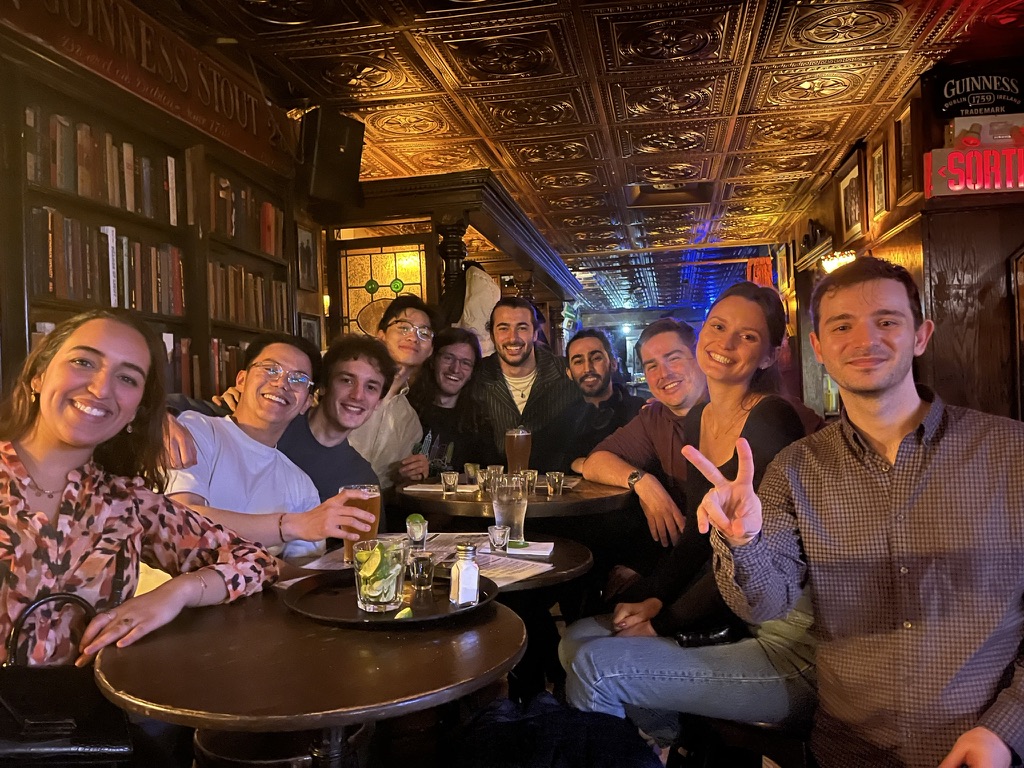 Having fun with the team!
Having fun with the team!
Lesson 5: Enjoy the journey because it’s a marathon not a sprint!
This is probably the biggest lesson I’ve taken away from FRV. For those who knew me during my time there, you would probably remember me being either a) super responsive ALL the time or b) somewhat complaining how busy my schedule and my weeks would be. To be honest these are okay in short sprints or during busy work semesters. However, doing this for 3 years non-stop balancing school, other internships, social life, sports and other projects, I realised that it just is not sustainable in the long-term.
So no matter how strong your why is, how badly you want it, continue to work hard but also take sometime to enjoy the other things life offers, especially while you’re still in university. You only live your early 20s once! So go and also enjoy other things as much as you grind FRV and other projects. Looking back some of my biggest regrets were perhaps not going to that “one social” because I was “busy” with work but looking back I don’t think that piece of work would have mattered as much as the potential memories created.
Key lesson: Work hard, but also take a step back every now and then and reset yourself. Contrary to popular belief you won’t work twice as harder if you are four times as tired from potential burnout.
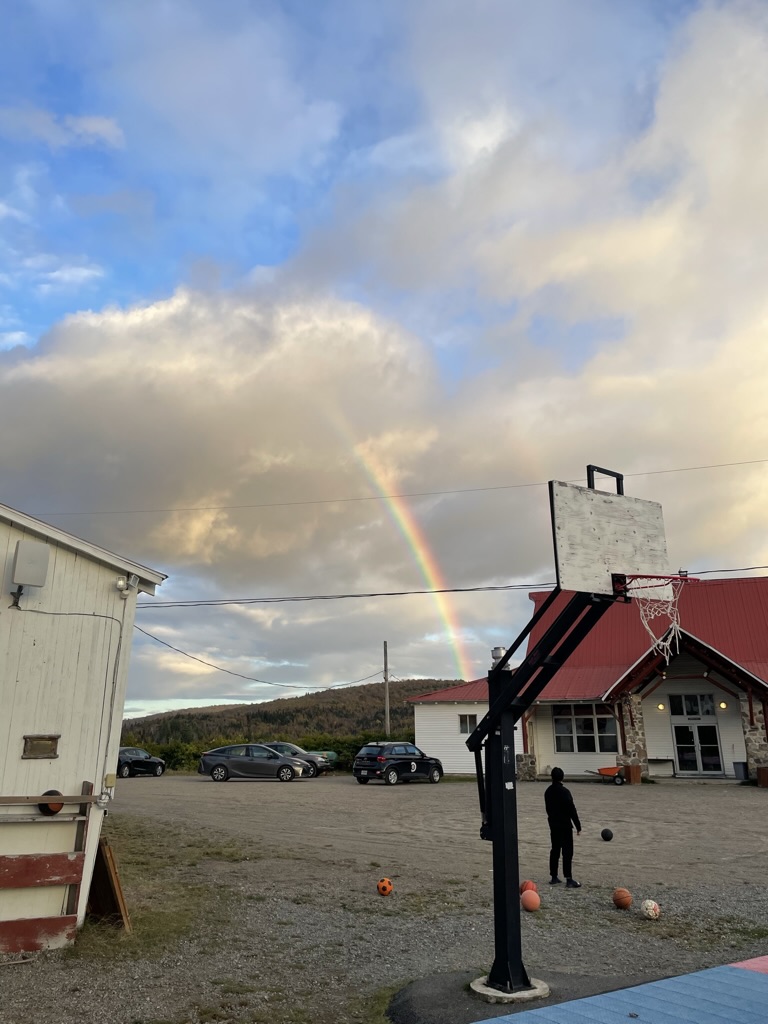 Finding rainbows in the journey, a reminder to enjoy the moments along the way
Finding rainbows in the journey, a reminder to enjoy the moments along the way
Conclusion
The last thing I will say is at the end of the day remember to have fun because if you don’t like what you do and you don’t have fun, 99% of the time you will not be able to put do your greatest work. Enjoy the process, don’t get too caught up in the weeds of it and take a step back once in a while and appreciate how far you have come!
I’m rooting for you and good luck!
If you enjoyed this, you might like: